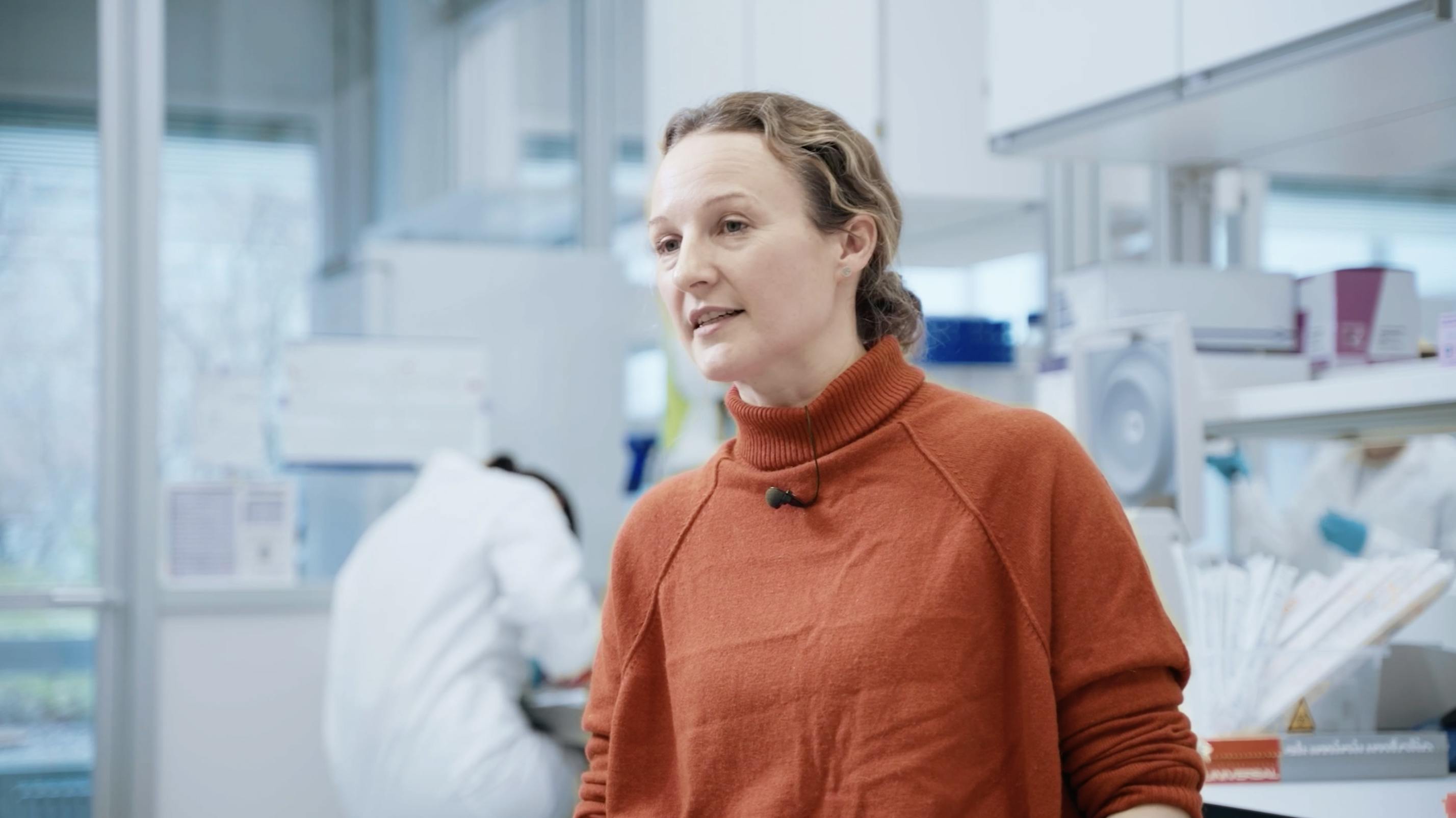
Contact
Professor Onur Boyman MD
Director of the Department of Immunology at
University Hospital Zurich
Professor in the Faculty of Medicine
at the University of Zurich
+41 44 255 20 69
E-Mail
UMZH institutions
University of Zurich
ETH Zurich
University Hospital Zurich
Balgrist University Hospital
Team
Barbara M.* has yet another bladder infection. The 43-year-old suffers from this type of infection, which is caused by bacteria, at least five times a year. Following the onset of initial symptoms, she drinks a lot of water – in the hope that she can flush the bacteria out of her bladder as quickly as possible. However, this does not usually help. Hermann W.* suffers from chronic cystitis, the medical term for a bladder infection. He has to wear an indwelling catheter, which puts him at greater risk of developing a UTI. As a diabetic, Erich B.* also belongs to the high-risk group for bladder infections. He has recurrent issues with his bladder. To be on the safe side, physicians normally prescribe antibiotics to treat UTIs. However, antibiotic resistance is on the rise and, in many cases, despite medication, the infection promptly returns, becomes chronic and can ultimately cause kidney disease.
Preventing antibiotic resistance
«Bladder infections can, for example, be brought on when gut bacteria enter the urinary tract,» explains Thomas M. Kessler, Senior Physician in Neuro-Urology at Balgrist University Hospital and a professor in the Faculty of Medicine at the University of Zurich. If bacteria are spread to the bladder via the urinary tract, they can multiply there and cause an infection. When antibiotics are administered, however, they not only destroy the harmful germs, but also the friendly bacteria of the healthy microbiome. This can weaken the body’s natural defenses and impede the restoration of a healthy balance. As Thomas Kessler explains, treatment alternatives that support the microbiome are the order of the day.
He is heading up an interdisciplinary team working on «mTORUS» (Microbiome-based Therapeutic Options for Recurrent Urinary Symptoms), a research project jointly supported by The LOOP Zurich and the Monique Dornonville de la Cour-Foundation, which aims to explore new treatment options. The project was launched in mid-2023 with the objective of circumventing the risk of antibiotic resistance and developing therapies based on precision medicine.

Thomas M. Kessler is heading up an interdisciplinary team working on «mTORUS». The project runs until 2028 and is supported by The LOOP Zurich, among others.
Longitudinal study with large data sets
In the mTORUS project, urine, blood, and stool samples as well as vaginal smears or bladder tissue are regularly collected from over 350 test subjects over an extended period of time. «mTORUS is a longitudinal study in which a vast amount of data is collected,» says Kessler. The study participants are divided into six categories: healthy individuals, individuals with bacteria in the bladder but with no symptoms, those with an indwelling catheter, individuals experiencing recurrent bladder infections, those who have recovered from a bladder infection, and a sixth group comprising individuals suffering from bladder cancer. A digital picture of each patient is created based on their clinical findings and medical history. These digital models that include thousands of data points are used with a view to gaining a better understanding of the dynamics of UTIs, identifying risk indicators, and enabling the development of a course of therapy tailored to each individual.
Bacteria that go under the radar
But why are some people prone to recurrent bladder infections? «We suspect that the microbiome of the bladder becomes unbalanced when an individual experiences a recurrent infection,» says Thomas Kessler. The previous doctrine that the bladder is sterile is inaccurate. Recurrent infections could be caused by bacteria that settle in cells or cell junctions of the bladder – where they are out of the reach of antibiotics, bacteriophages, or the weapons of the immune system. As Kessler points out, «it’s as if the bacteria are invisible, hidden beneath an invisibility cloak.» Left undisturbed, they multiply, and after a few days or weeks, they can give rise to a new infection and displace the healthy microbiome.

«Our research group for a long time has been interested in how the immune system and the microbiome work together. Within mTorus we can start to expand this knowledge into the urinary tract,» says Emma Wetter Slack in the video. She is a professor for mucosal immunology at the ETH Zurich.
Bacteriophages: Therapeutic viruses
The researchers working under Kessler have so far demonstrated that bacteriophages can destroy germs in the bladder. These so-called «bacteria-eaters» do this just as successfully as antibiotics! «An extremely exciting and promising finding; bacteriophages are proving to be therapeutic viruses,» concludes Kessler. «In close collaboration with researchers from ETH Zurich, we have genetically modified bacteriophages in such a way that they they systematically destroy the harmful bacteria in the bladder.» This collaboration between the researchers is also being intensified as part of the ImmunoPhage project.
Despite the potentially revolutionary effect of bacteriophages, these promising helpers have so far only been used in the context of research in Switzerland. The reason for this is a shortage of high-quality studies and the resulting lack of a sound basis for development in accordance with marketing authorization legislation. mTORUS may change this.
«Push-pull» treatment
«With the push-pull strategy, we will use genetically modified bacteriophages to specifically eliminate pathogens and transplant a healthy microbiome into the bladder,» explains Kessler. «This is all based on a series of complex data analyses that give us an idea of the optimal composition of the microbiome by drawing on bioinformatics and computer-aided models.» The microbiome can look slightly different for each individual, which is why the researchers are being guided by a precision medicine approach.
Maintaining bladder health without antibiotics
The data generated from the samples combined with new computer models form the basis for research into bladder health. Urologist Kessler hopes that «findings about the bladder’s microbiome, the effect of bacteriophages, and the associated diagnosis of patients in Zurich and around the world will help free us from our chronic reliance on antibiotics in the future. This may even help prevent illnesses before they take hold or become serious. These findings could also be applied to other bacterial infections, systemic inflammatory diseases, and possibly bladder cancer. But more research is needed before bacteriophages and findings relating to the bladder's microbiome can have a therapeutic effect for patients.»
*Names changed

«The computer-aided models allow us to understand more precisely what the interaction between the immune system, the microbiome and the various treatments looks like», says Gunnar Rätsch in the video. He is a professor for computer science and deputy head of the Institute for Machine Learning at the ETH Zurich.
Service
Bladder infection?
Clinic at Balgrist University Hospital
Diagnosis and treatment at University Hospital Zurich







Glossary
Urinary tract infection:
When bacteria are present in the urinary tract, trigger an inflammatory reaction there, and cause problems for the person affected, it is described as a urinary tract infection (UTI). For anatomical reasons, UTIs are more common in women. Among men, the risk increases with age.
Bacteriophages:
Viruses that infect bacteria and reprogram them with their genetic material. The viruses reproduce and destroy the bacteria (the Greek word phagos means eaters.)
Longitudinal study:
Type of study in which a sample is analyzed over a defined, extended period of time with regard to previously defined characteristics
Who is co-financing this project? (in CHF millions)
The LOOP Zurich - Medical Research Center
The project funding lasts from 2023 to 2028
Credits
Text: Marita Fuchs
Pictures: Frank Brüderli
Video: Daniel Grunder
University of Zurich: Onur Boyman, Thomas M. Kessler, Lorenz Leitner, Shawna McCallin
Balgrist University Hospital: Thomas M. Kessler, Shawna McCallin, Lorenz Leitner
University Hospital Zurich: Onur Boyman
ETH Zurich: Gunnar Rätsch, Shinichi Sunagawa, Emma Wetter Slack, Martin J. Loessner, Nicola Zamboni, André Kahles





